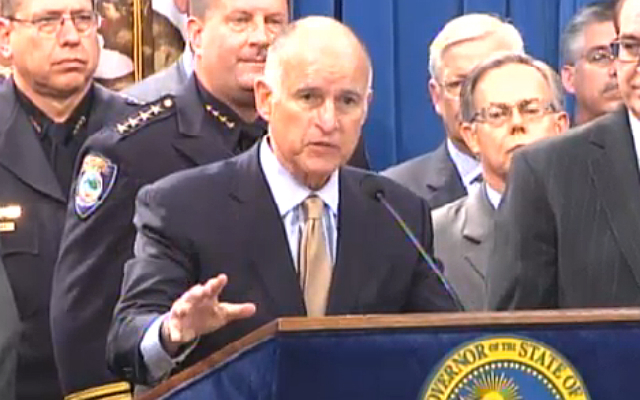
Governor Jerry Brown to speak at session on his Rainy Day Fund proposal. (Photo Credit: Cal Channel)
UPDATE – Tuesday, April 29 (John Guenther)
Governor Jerry Brown took an extraordinary step of appearing before an extraordinary Assembly budget session yesterday to encourage members to support his proposal for a rainy day fund to be inserted into California’s constitution via the ballot in November.
“Self-restraint is really what this is about: putting it in the Constitution and laying it out for a number of years,” said Brown. “There is some curb because, if you don’t curb, you’ll go into a constant state of boom and bust.”
Brown was looking for a bipartisan consensus on the fund to give a boost to the ballot campaign later this year. Legislators appeared to be mostly supportive of the fund as something to put a brake on spending during up years and cause legislators to think about budgeting over the long-term, especially for when spending-cautious Brown is out of office.
There was concern over the details of how the fund would operate, including what conditions would have to be met for money to be pulled out of the fund, one idea being a two-thirds vote threshold in the legislature. Brown said he is ready to “explore both a vote threshold or conditions where you have to have one, two, and three or no funds come out.”
After Fred Silva, senior fiscal policy advisor of CA Fwd, expressed support for the fund framework, Assembly member Jeff Gorell (R-Camarillo) said he supported ideas similar to CA Fwd’s for building in some consistency in capturing and saving funds. CA Fwd recently released a report on ways to build in a stronger budget reserve.
Brown wrapped up his remarks by relating the current drought with the rainy day fund, saying that fund would restrain the state in advance “when we’re not so thirsty.”
“Let’s show the people of California that this legislature is about doing their business, not about scoring points for one special interest or another,” said Brown.
———————
California Forward submitted testimony today in support of a framework for crafting a new Rainy Day Fund proposed by the Governor in January and introduced as a bill by the Assembly Speaker last week.
The Governor himself is expected to testify in an Assembly Budget Committee hearing this afternoon—the first of the newly-convened special session on building a new budget reserve—and to echo his recent statements about the importance of “protecting the state from the effects of boom-and-bust budget cycles.”
In its testimony, CA Fwd noted that the Rainy Day Fund proposal, ACAX2-1, takes aim directly at one of the major sources of the state’s budget problems: its volatile revenue structure—and unpredictable capital gains revenue, in particular.
CA Fwd urged lawmakers to rely on this framework as the foundation for developing an effective policy, while also outlining two opportunities to strengthen the reserve so it will protect the state in future recessions. These include a proposal to make deposits into the reserve more consistent and several options for capturing revenue spikes more effectively and transparently.
“Many of California’s money problems have resulted from short-term decisions that led to boom-and-bust budgeting. This new Rainy Day Fund could reduce this problem,” said Jim Mayer, president and CEO of CA Fwd. “Since 2008, CA Fwd has promoted ways to capture spikes in revenue—and limit how those dollars could be spent. In the past, lawmakers have used spikes to cut taxes and expand programs—only to create a fiscal crisis in future years. The spikes should be used to pay down debt, save for recessions, or pay for one-time spending like infrastructure and technology. The Governor’s proposal, introduced by the Speaker, is a great start in the right direction.”
For more details on this new proposal and for CA Fwd’s views on the Rainy Day Fund, see the CA Fwd testimony below. CA Fwd also produced a more detailed report on how to build a reliable budget reserve in April. CA Fwd’s Jim Mayer spoke in this video about lawmakers’ willingness to take on this long-time budget challenge.

